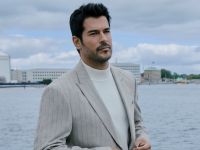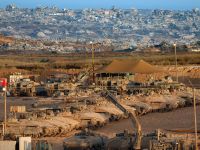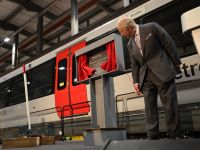By Munir K. Nasser
Chief Correspondent, Washington, DC
Albawaba.com
In what seems his last foreign policy speech, President Bill Clinton said he has “worked so hard to make America a force for peace in the Middle East.”
Clinton, outlining his administration's foreign policy in a speech December 8 at the University of Nebraska, said the US has made a lot of progress in the Middle East. He described the region as “the home of the world's three great monotheistic religions where God is reminding us everyday that we are not in control.” He said ‘We've seen a peace treaty between Israel and Jordan. We saw a sweeping agreement between the Israelis and the Palestinians and progress toward implementing it over the last eight years."
Clinton said that the Israeli and Palestinian sides are down now to the hard decisions, and they've gotten to those fundamental identity questions. “Is it possible for them to look at each other and see their common humanity, and find a solution in which neither side can say, I have vanquished the other. Or have there been so many years of history welling up inside them that neither side can let go. That is the issue, and we will continue to work on it,” he said.
Clinton noted that he will be gone in a few weeks, and America will have a new president and a new Congress, “but you ought to support them when they want to do these things, because it's very, very important to the stability and future of the world.
Clinton outlined the five broad themes that have guided his administration’s foreign policy in the last eight years. "There is no longer a clear, bright line dividing America's domestic concerns and America's foreign policy concerns," and it is "profoundly important" that every American be educated about the rest of the world, Clinton told his University audience that included some 6,000 students.
Globalization cannot be reversed, Clinton said, "but it has more than one possible destination. "If we want America to stay on the right track, if we want other people to be on that track and have the chance to enjoy peace and prosperity, we have no choice but to try to lead the train."
Democracy is fragile in some places and could be reversed, he said, urging tolerance for people of different races and religions. "All we have to do is read the paper every day to know that old
hatreds die hard, and their persistence -- from Bosnia and Kosovo, to the Middle East, to Northern Ireland, to the African tribal wars, to places like East Timor -- have in our time led to hundreds of thousands of deaths and countries being impoverished for 10 years or more because people couldn't give up their old hatreds to build a new future together."
Clinton said the first theme that has guided his administration's foreign policy is "maintaining strong alliances with people who share our interests and our values, and adapting those alliances to meet today's and tomorrow's challenges."
In Europe, he said, "we have to stay the course, keep expanding NATO, keep working with the Russians, keep burden-sharing to do what needs to be done."
The same thing is true in Asia, said Clinton. "What we have done is to decide to keep our troops in the Pacific, to renew our alliance with Japan. We sent ships to keep tensions from escalating between China and Taiwan. We stood by South Korea and diminished the nuclear threat from North Korea, and we supported the South Korean President's decision to seek an end to 50 years of tension on the Korean Peninsula, for which he justifiably won the Nobel Peace Prize."
"We ought to stay there," he said, "modernize our alliances, and keep the peace so we don't have to fight any more wars in the 21st century."
There also must be "a systematic, committed, long-term relationship with our neighbors in Latin America and the Caribbean, with South Asia" and Africa, he said.
The second theme, said Clinton, has been to build, "if we can, constructive relationships with our former adversaries, Russia and China. One of the big questions that will define the world for the next 10 years is, how will Russia and China define their greatness in the 21st century? Will they define it as their ability to dominate their neighbors, or to control their own people? Or will they define it in a more modern sense, in their ability to develop their people's capacity, to cooperate with their neighbors, to compete and win in a global economy and a global society?"
The third theme, the President said, is to realize "that local conflicts can become world-wide headaches if they're allowed to fester. Therefore, whenever possible, we should stop them before they get out of hand. That's why we've worked for peace in the Balkans between Greece and Turkey, on Cyprus between India and Pakistan; Ethiopia and Eritrea. It's why I'm going back to Northern Ireland next week, the land of my ancestors.
Clinton said that while the United States wants to be a force for peace, people "ought to do their part in their own backyard. But we're in a unique position in history now. There is no other military
superpower or economic superpower, and we can do some things, because we've maintained a strong military, that nobody else can do."
He asserted that the United States ought to pay its dues to the United Nations and its "fair share of peace-keeping operations."
The fourth theme, said Clinton, is that the growing openness of borders and technology is changing America's national security priorities. "People, information, ideas and goods move around more freely and faster than ever before. That makes us more vulnerable first to the organized forces of destruction: macrotraffickers, terrorists, organized criminals," he said.
Part of this challenge, said Clinton, "is just to get rid of as many weapons of mass destruction as possible. That's why we got the states of the former Soviet Union outside Russia to give up their nuclear arsenals. And we negotiated a worldwide treaty to ban chemical weapons. That's why we forced Iraq to use its oil revenues to buy food and medicine and not to rebuild its weapons. And I think the other countries of the world that are willing to let them spend that money rebuilding their weapons systems are wrong, and I hope that we can strengthen the resolve of the world not to let Saddam Hussein rebuild the chemical weapons network and other weapons systems that are bad. that's why we negotiated the freeze on plutonium production with North Korea."
The final theme, the President said, is that "we should be for more open trade, but we have to build a global economy with a more human face."
Clinton noted that his administration negotiated some 300 trade agreements, from NAFTA to the World Trade Organization, that "have given us the longest economic expansion in history. Over 25 percent of our growth is tied to trade now."
The problem, he said, is that the benefits have not been shared across the globe. "800 million people still go hungry every day; more than a billion people have no access to clean water; more than a billion people live on less than a dollar a day; every year, 6 million undernourished boys and girls under the age of five die."
Clinton urged the next U.S. president and Congress to work to relieve the burden of the world's poorest countries in debt, to fund education, health care, and development; to spend money on fighting HIV/AIDS; and to expand the micro credit program, which loans money to entrepreneurs in poor countries.
© 2000 Al Bawaba (www.albawaba.com)







